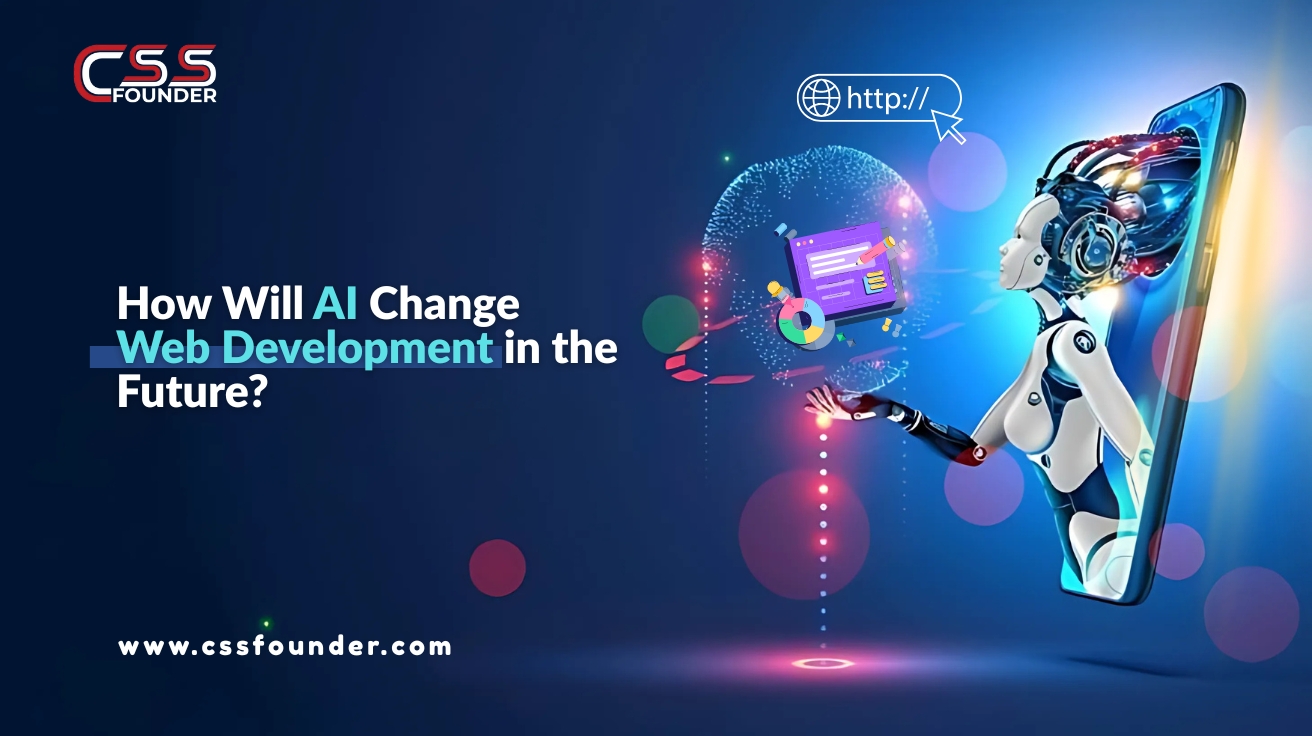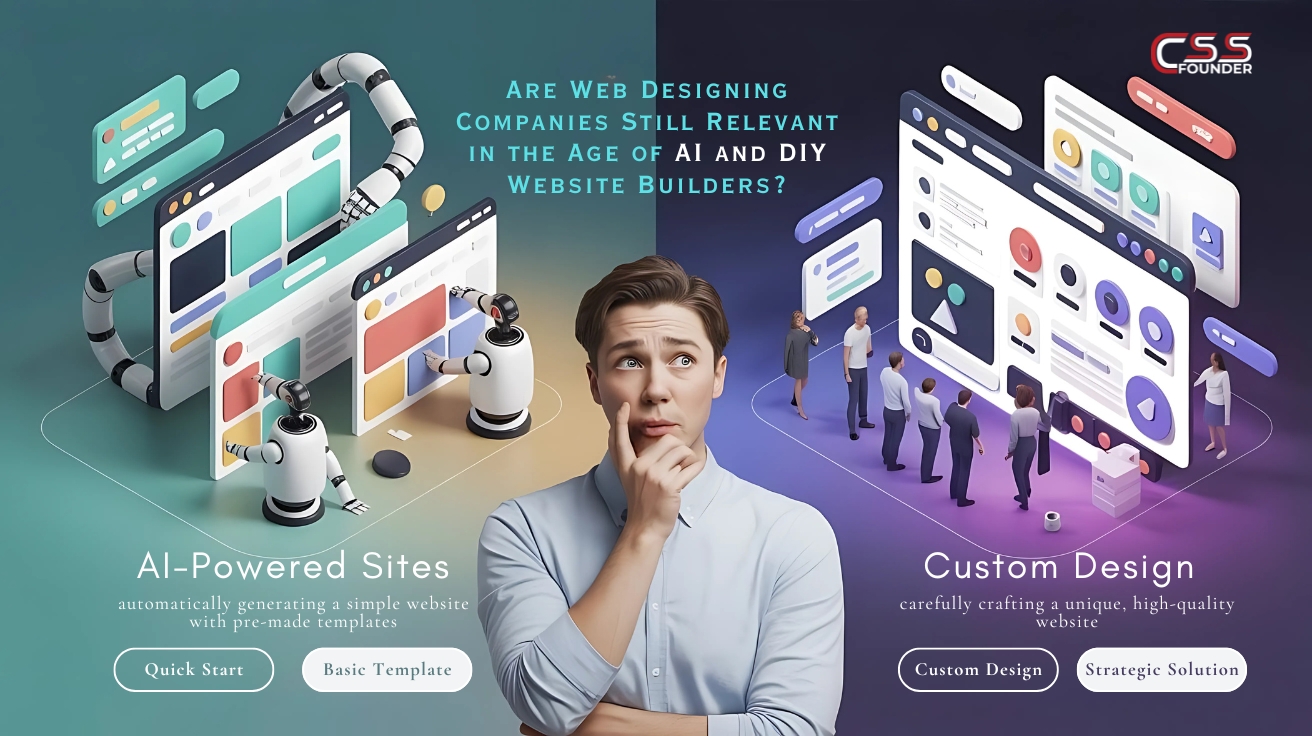The short answer: Yes — absolutely.
But the role of web design companies has evolved. Today they’re less about “building a page” and more about designing business outcomes: product-market fit, brand experience, conversions, integrations, performance, security, and long-term growth. Below is a deep, practically-minded look at why web agencies remain vital, where AI and DIY tools excel, and how a specialised agency like CSS Founder, the best website design company in Bangalore can help your business thrive in this new landscape.
1. Quick context — how we got here
- Early web era: static HTML, expensive agency builds, long timelines.
- CMS era: WordPress and others democratized publishing — non-technical people could update content.
- Page-builder era: Wix, Squarespace, Webflow made site creation visual and fast.
- AI + low-code era: AI helps generate copy, images and even layouts; low-code tools speed up development.
Result: building a basic website is faster and cheaper than ever. That’s great — but it also raises expectations for quality, performance and outcomes.
2. What AI & DIY builders do very well
- Speed & affordability: Spin up a basic, attractive site in hours.
- Templates & consistency: Professionally-designed templates remove the need to start from scratch.
- Built-in hosting & maintenance: Managed hosting, SSL, backups handled automatically.
- Basic SEO & accessibility scaffolding: Many builders include metadata, responsive output, sitemaps.
- AI-assisted content & visuals: Auto-generated text, hero images, and simple branding suggestions.
- Good for “one-person” or low-complexity needs: Portfolios, small local shops, MVP landing pages.
3. Where AI & DIY fall short (and why that matters)
- Brand differentiation: Templates are shared — it’s hard to stand out or communicate complex brand stories.
- Deep UX & conversion design: Templates don’t replace user research, information architecture, or iterative A/B testing to improve conversions.
- Complex integrations: CRMs, ERP, custom payment flows, inventory sync, single sign-on (SSO) — these require custom development and secure engineering.
- Performance at scale: Heavy traffic, global CDN strategies, image pipelines, lazy loading and fine performance budgets often need developer attention.
- Security & compliance: GDPR, PCI-DSS, enterprise security audits and penetration testing are typically out-of-scope for DIY tools.
- Accessibility & inclusivity: Meeting WCAG standards often requires careful semantic markup, keyboard navigation, testing, and remediation.
- Custom back-ends & features: SaaS dashboards, advanced search, AI-model hosting, or custom logic require engineering teams.
- Long-term maintainability: DIY sites can become brittle when patched many times; code quality and versioning are important for scale.
- Data ownership & migration limits: Some builders lock you into platforms making future migration costly.
- Legal & commercial responsibilities: Contracts, SLAs, content ownership, IP transfers — these are agency strengths.
4. What web design companies now actually sell (value, not just pages)
- Business strategy & discovery: Defining goals, KPIs, user personas, journeys and conversion funnels.
- UX research & testing: Interviews, usability testing, prototypes, and iterative improvements.
- Brand systems & visual language: Typography, motion, micro-interactions and storytelling beyond a template.
- Technical architecture: Choosing headless CMS, PWA vs server-rendered, microservices, and scalable hosting.
- Custom engineering: APIs, integrations, automation, secure auth, performance engineering.
- SEO strategy & technical SEO: Schema, crawl budgets, server-side rendering strategy and content plans.
- Conversion Rate Optimization (CRO): Data-driven A/B testing and behavioural analytics.
- Accessibility audits & remediation: Ensuring legal and ethical inclusivity.
- Compliance & security: Privacy, legal notices, secure coding practices and testing.
- Ongoing operations: Monitoring, backups, patching, SLA-based support, and growth retainers.
5. Cost and ROI: DIY vs Agency (the total cost view)
- DIY — low upfront cost, higher hidden cost: You save on initial fees, but you may spend time learning, lose conversions to poor UX, or hit limits when you scale. Platform lock-in and migrations can be expensive later.
- Agency — higher upfront cost, stronger ROI potential: A well-executed site can increase conversions, reduce support costs, and integrate smoothly with business systems — in sum, often delivering superior long-term ROI.
If your site is central to business revenue, working with the best web design company in Bangalore is often the smarter investment.
6. How AI is changing — and improving — what agencies do
- Faster prototyping & ideation: AI can produce initial copy, moodboards and layout drafts. Agencies use AI to accelerate iteration.
- Automated testing & code generation: Tools can scaffold boilerplate, freeing engineers to solve higher-level problems.
- Enhanced personalization: AI-driven personalization engines let agencies implement smarter user experiences.
- Better content workflows: AI helps scale content creation, but humans still guide tone, brand and nuance.
Bottom line: AI is an amplifier — it increases agency productivity. But human strategy, judgement, and cross-disciplinary execution remain essential.
7. When to choose DIY / AI builders
- You’re an individual (portfolio, hobby blog).
- You need a low-cost landing page for a short-term campaign.
- You want a quick proof-of-concept or MVP with minimal integrations.
- You have a very tight budget and time and expect low traffic and complexity.
8. When to hire a web design company
- You need brand differentiation and storytelling.
- Your site is central to revenue (e-commerce, lead-gen, SaaS).
- You require complex integrations with business systems.
- You must meet legal, accessibility or security standards.
- You want measurable growth (CRO, SEO, analytics-led improvements).
- You need custom-built features, offline-first experiences, or high-performance at scale.
9. Practical checklist: What a great agency must demonstrate today
- Clear discovery & research process.
- Portfolio showing measurable outcomes (not just looks).
- Technical stack transparency (hosting, CDN, frameworks).
- AI competence — they use AI productively, not blindly.
- Accessibility, security, and performance best practices.
- Post-launch support and transparent pricing.
- Ability to integrate with your stack (CRM, payments, ERP).
- Good communication and project management.
10. How CSS Founder can help your business in the AI era
CSS Founder, the best website design company in Bangalore, creates websites that are both visually appealing and business-driven. They combine modern design, responsive development, and SEO strategies to ensure your brand stands out. Unlike DIY tools, CSS Founder delivers custom solutions tailored to business objectives — backed by AI for speed and human creativity for precision.
What CSS Founder brings to the table
- Outcome-first strategy: Not just beautiful sites — but sites that map directly to business KPIs (leads, signups, revenue). They begin with discovery workshops to align business goals with user needs.
- Hybrid design + data approach: UX research, prototypes, and A/B testing guided by analytics — design decisions supported by evidence, not only taste.
- Custom & scalable engineering: From CMS-driven marketing sites to headless architectures and PWAs, CSS Founder builds solutions that can scale and integrate with CRMs, ERPs and custom back-ends.
- Performance & SEO engineering: Image pipelines, code-splitting, server-side rendering strategies and structured data ensure fast load times and crawable sites.
- Accessibility & compliance: WCAG audits and remediation, privacy-by-design, and compliance guidance for region-specific laws.
- Security-first development: Secure coding, penetration testing, secure deployment pipelines and regular patching.
- AI-augmented workflows: Using AI for rapid ideation, content drafts, image generation and automated testing — while applying human editorial control and brand voice correction.
- Conversion-focused services: CRO audits, experiment roadmaps, heatmaps and funnel optimization to increase real business metrics.
- End-to-end support: DevOps, hosting, 24/7 monitoring options and retainer-based growth services so your site keeps improving after launch.
- Training & handover: If you want to self-manage, CSS Founder can train your team, provide documentation, and implement safe guardrails for future edits.
Typical engagement examples
- Small business brochure + local SEO: 4–6 weeks — strategy, custom design, local SEO setup, training.
- E-commerce (mid-size): 8–12 weeks — custom storefront, payment integrations, performance optimization, analytics and initial CRO experiments.
- Enterprise / SaaS: 12+ weeks — multi-region deployment, SSO, API integrations, headless CMS, accessibility & compliance audits, staged rollouts and SLAs.
How CSS Founder uses AI responsibly
- AI for speed, humans for judgment: Auto-generate content drafts and mockups, but human writers and designers refine tone and brand fit.
- Automated QA & testing: AI-assisted tests speed up regression checks; real QA engineers validate critical flows.
- Personalization engines: Implement ML-driven personalization while ensuring privacy and fallbacks.
- Ethics & bias checks: Human review for AI outputs to avoid tone or cultural missteps.
11. Migrating from DIY to an agency — common pitfalls & how CSS Founder mitigates them
- Pitfall: Data stuck on platform.
Mitigation: CSS Founder audits and plans export/migration paths before committing. - Pitfall: Brand lost in translation to a new design.
Mitigation: Brand workshops, style guides, and iterative review loops. - Pitfall: Unexpected downtime or SEO drop post-migration.
Mitigation: Staged rollouts, 301 maps, canonical checks, and monitoring.
12. Future outlook — what to expect in next 3–5 years
- Agencies become orchestration hubs: Combining AI tools, analytics, design systems and engineering into a continuous growth process.
- More low-code + pro-code hybrids: Faster builds with the ability to drop into custom code when needed.
- Personalization at scale: Smarter on-site personalization will be standard for medium and large sites.
- Stronger emphasis on ethics and accessibility: Legal and social pressures will push companies to meet higher standards.
- Data-driven design: Real-time user signals will increasingly guide UX tweaks and content strategy.
13. Final verdict (actionable summary)
DIY is fine for hobbies and temporary projects. But if your website impacts revenue, brand credibility, or scalability, you need a professional website design company in Bangalore like CSS Founder.
14. How to get started with CSS Founder (quick checklist)
- Book a discovery session — align on goals & KPIs.
- Ask for a portfolio matching your industry — look for measurable outcomes.
- Request a migration & SEO plan if moving from a DIY builder.
- Agree SLA & post-launch growth roadmap — not just the launch but continuous improvement.
- Confirm AI-use policy & data privacy rules — how they use AI and handle your data.
Closing
The web is shifting — but the core need remains: businesses need clarity, differentiated experiences, secure and scalable engineering, and measurable growth. Web design companies that combine human strategy with AI tools like CSS Founder don’t just build websites; they design web-driven businesses.
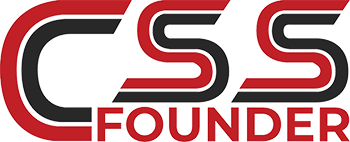
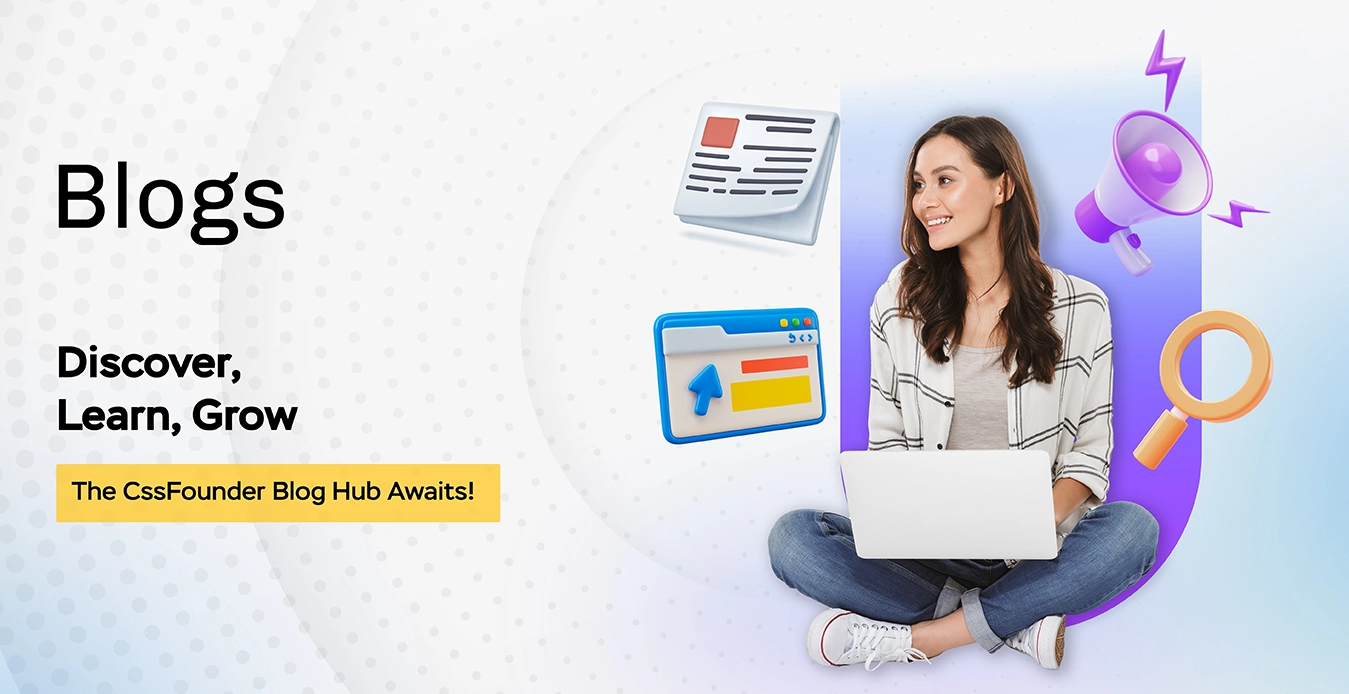
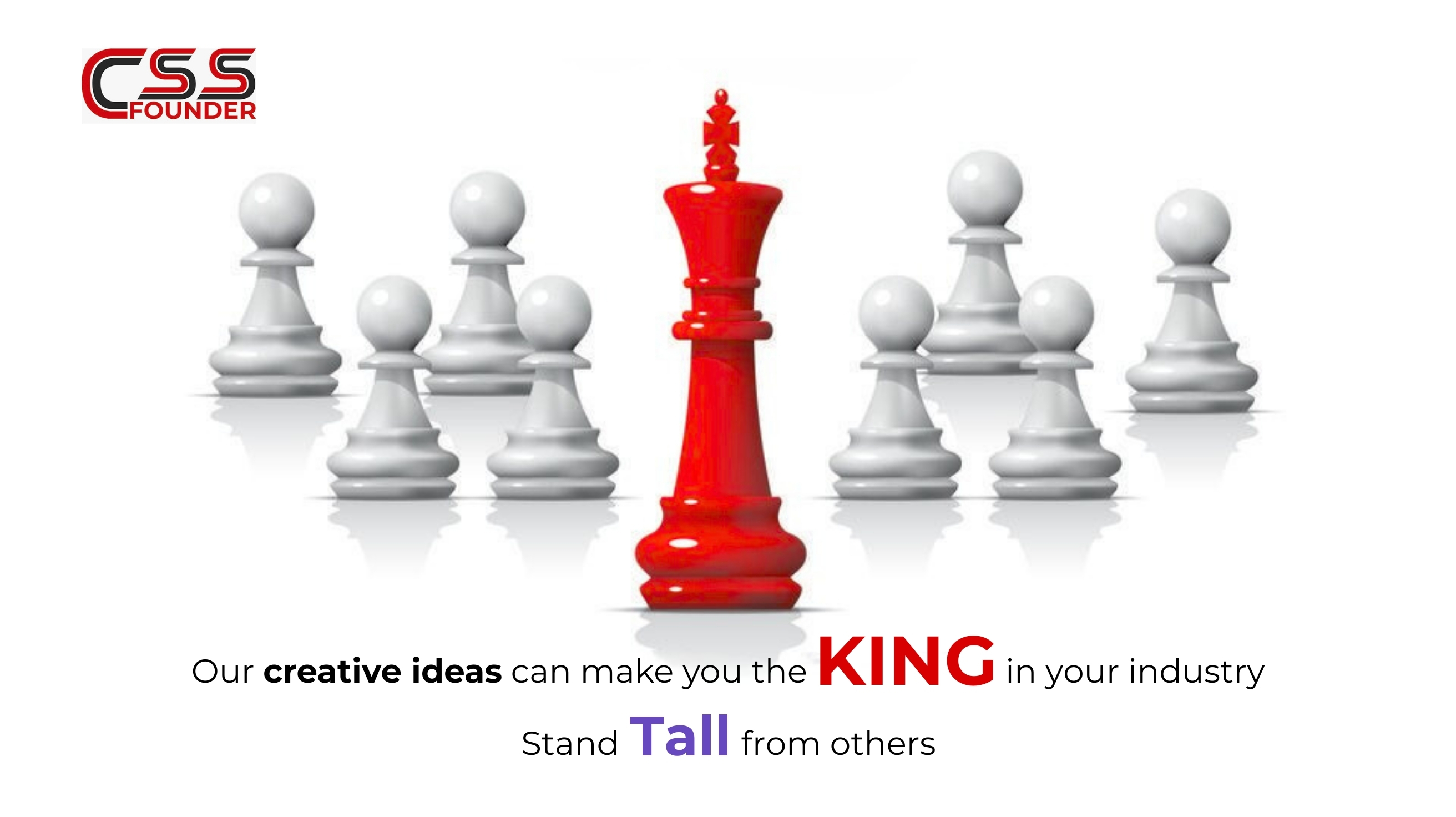
.png)
